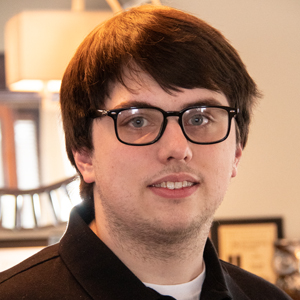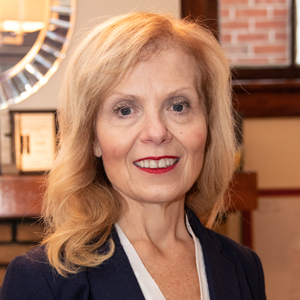Nursing Faculty Members Lead the Way on Virtual Clinical Experience Project
Nursing faculty members Jacob Fisher ‘14 MSN, RN and Patricia Nirelli, MSN, RN, WCC recently developed a virtual clinical learning experience (VCLE) titled “leadRNme” for an undergraduate nursing course as part of their Master’s of Science in Nursing thesis experience at Daemen College. Amanda Cody ’10 MSN, RN also worked on the project.

They presented on their project at the 2017 Online Learning Consortium Conference in Orlando, Fla. and the Daemen College Spring 2017 Academic Festival. In addition, they recently co-authored an article published in Nursing Education Perspectives, the peer-reviewed, research journal of the National Nursing League.
The project was developed for Daemen’s NUR 417, which focuses on leadership, inter-professional teamwork, and quality improvement to improve quality of health care services. Students in the course observe nurse leaders within various nursing areas. Traditionally, the course has 140 students that need to meet the required hours.
The VCLE—designed by Fisher, Nirelli and Cody—was developed to help expose students to all aspects of leadership and change without requiring them to be onsite in an actual clinical setting.
“leadRNme” 101

In the VCLE, an unfolding case study incorporates decision making and critical thinking along with clinical reasoning, as the students need to determine the solution to the presented problems based on their role. It exposes students to a huddle that is occurring on a nursing unit as a pre-briefing experience before breaking down each step of the process.
As students are actively engaged in the unfolding case study, they must answer questions in order to progress to the next scene. Upon completion of the VCLE, students complete and submit a reflection assignment to their instructor for the course.
The VCLE allowed for both summative and formative assessment of the student’s learning and application abilities of communication, inter-professional teamwork, quality improvement, and change within the health care setting,” Fisher explains. “Students openly expressed their thoughts and feelings with the experiences within their assigned learning circles, allowing for debriefing to occur with students and clinical instructors.”
Q&A with Nirelli and Fisher
Fisher and Nirelli share some takeaways from the experience of designing “leadRNme” and how it’s shaped their own careers and education.
What are you proudest of in regards to this project?
Nirelli: Creation of low-cost collaborative education platform; shows promise for opportunities future in nursing curricula; and that the complex subject material and unique educational platform may have a positive effect on student licensure pass rates.
Fisher: My proudest moment was seeing all of the components come together at the end. While tutoring at Trocaire, I was involved in the nursing labs with students and was able to identify the value and importance of putting what was learned into practice. I was able to take that knowledge and focus on the virtual simulation design and functionality for the project, while utilizing the Cognitive Load Theory.
When I first agreed to the project, I had the “what am I getting myself into” thoughts. There were many elements of the project that I was inexperienced with. Through many long nights and early mornings, we were able to pull the project together. From start to finish, we completed the project in roughly 1 year, including developing a product starting in the middle of the Spring 2016 semester to have the project implemented in a summer course of NUR 417, having time to make revisions by the October conference in order to present, and collecting the final data in the Fall 2016 semester.
Then it was time for the data analysis and number crunching—was there differences in learning outcomes between the VCLE and the traditional clinical experience? As part of the funding we received, we needed to produce a publication worthy article to submit to the Think Tank committee. The decision was made if we needed to already produce an article, why not submit it for publication. After having to make minor revisions, we are waiting for the final publication to occur! Having the chair of the nursing department of Daemen College along with the faculty and community members in the room while presenting was a huge accomplishment. The kudos from the Vice President of Academic Affairs and the Think Tank Committee was like no other.
How did this project contribute to your Masters in Nursing education?
Nirelli: This Think Tank project was well planned and was put into place on time with great success. This has allowed me the opportunity to present this project nationally and is receiving great recognition within academia.
Fisher: Although completing a thesis or project was a requirement for completing my Master’s degree, the end product and all of the steps from start to finish allowed for more than a requirement but an opportunity for growth and stepping out of my comfort zone. Part of the funding requirements include presenting findings at a conference. Again, we decided we might as well go big.
The process and ins and outs of presenting really allowed me to take a step back and look at the importance of not only growth and development for nursing and for education but also the professional development that occurred for myself. Nursing education is constantly changing, and as educators, we too need to change. Clinical sites can be difficult to secure and additional learning experiences such as virtual simulation can help close the gap between the classroom and clinical settings.
How has it impacted your work as an educator at Trocaire?
Nirelli: I was offered and accepted the position of Director of Nursing Laboratory and Simulation-Based Learning at Trocaire in January 2019, partly as a result of my experience gained while working on this VCLE. In this position, I will be able to create a student experience that will incorporate key concepts throughout the nursing curriculum that will support critical to system level thinking.
Fisher: Being part of the project has afforded me a great deal of information, knowledge, and experience that I can incorporate into my teaching. I completed my education practicum at Trocaire while I was finishing my degree. I was able to help make some changes to open lab and simulation lab, in particular, help to develop and incorporate new scenarios. Developing the VCLE helped to identify the barriers that can occur when trying to develop a scenario. There are so many more ways to learn than inside of the classroom. The VCLE helps take information students have learned in class and apply it to practice. The learning activity allows for experimental learning while providing students with rationales and the “whys.” Using adaptive learning places some of the responsibility of learning to the student.

